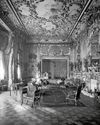From tipsy manservants to illicit affairs, these three properties in Dorset, Oxfordshire and North Yorkshire have fascinating histories

IN Roman times, the village of Radipole, on the River Wey, was a port of some importance, through which trade flowed to the thriving garrison town of Dorchester, now Dorset’s county town. Over time, the growth of Weymouth as a sailing and tourist centre, allied to changing parish boundaries, reduced Radipole to a quiet backwater on the northern edge of town. However, the ancient centre of the village, comprising the 12th-century parish church of St Ann, the adjoining 16th-century manor house and the 18th-century schoolhouse, has survived miraculously intact.
Tucked away behind the church and surrounded by trees and a high stone wall, The Old Manor House—the oldest part of which may have started life as a priest’s house or abbey grange—was owned by Cerne Abbey until its dissolution in 1539. A year later, Henry VIII granted the manor to Humphrey Watkins of Holwell, near Sherborne, who passed it to his eldest son, Richard.
He altered and extended the house in about 1580 (possibly to accommodate some or all of his six elder sisters and five younger brothers) and his initials ‘R. W.’ can still be seen above the doorway.
In the 1930s, The Old Manor House was owned by Capt and Mrs Cemmington Leigh, who employed the eminent Dorset architect Ernest Walmsley Lewis to oversee the careful restoration of the manor and its outbuildings over a 10-year period. His trademark attention to detail is evident throughout the house, many original features of which have been carefully preserved by the current owners, who bought it in 1994.
Currently on the market at a guide price of £1.85 million through Strutt & Parker (01392 215631), The Old Manor House, listed Grade II*, stands in just over an acre of landscaped gardens and wildflower meadow and offers more than 5,000sq ft of wonderfully atmospheric living space, including three spacious reception rooms.
Esta historia es de la edición February 27, 2019 de Country Life UK.
Comience su prueba gratuita de Magzter GOLD de 7 días para acceder a miles de historias premium seleccionadas y a más de 9,000 revistas y periódicos.
Ya eres suscriptor ? Conectar
Esta historia es de la edición February 27, 2019 de Country Life UK.
Comience su prueba gratuita de Magzter GOLD de 7 días para acceder a miles de historias premium seleccionadas y a más de 9,000 revistas y periódicos.
Ya eres suscriptor? Conectar

Kitchen garden cook - Apples
'Sweet and crisp, apples are the epitome of autumn flavour'

The original Mr Rochester
Three classic houses in North Yorkshire have come to the market; the owner of one inspired Charlotte Brontë to write Jane Eyre

Get it write
Desks, once akin to instruments of torture for scribes, have become cherished repositories of memories and secrets. Matthew Dennison charts their evolution

'Sloes hath ben my food'
A possible paint for the Picts and a definite culprit in tea fraud, the cheek-suckingly sour sloe's spiritual home is indisputably in gin, says John Wright

Souvenirs of greatness
FOR many years, some large boxes have been stored and forgotten in the dark recesses of the garage. Unpacked last week, the contents turned out to be pots: some, perhaps, nearing a century old—dense terracotta, of interesting provenance.

Plants for plants' sake
The garden at Hergest Croft, Herefordshire The home of Edward Banks The Banks family is synonymous with an extraordinary collection of trees and shrubs, many of which are presents from distinguished friends, garnered over two centuries. Be prepared to be amazed, says Charles Quest-Ritson

Capturing the castle
Seventy years after Christian Dior’s last fashion show in Scotland, the brand returned under creative director Maria Grazia Chiuri for a celebratory event honouring local craftsmanship, the beauty of the land and the Auld Alliance, explains Kim Parker

Nature's own cathedral
Our tallest native tree 'most lovely of all', the stately beech creates a shaded environment that few plants can survive. John Lewis-Stempel ventures into the enchanted woods

All that money could buy
A new book explores the lost riches of London's grand houses. Its author, Steven Brindle, looks at the residences of plutocrats built by the nouveaux riches of the late-Victorian and Edwardian ages

In with the old
Diamonds are meant to sparkle in candlelight, but many now gather dust in jewellery boxes. To wear them today, we may need to reimagine them, as Hetty Lintell discovers with her grandmother's jewellery